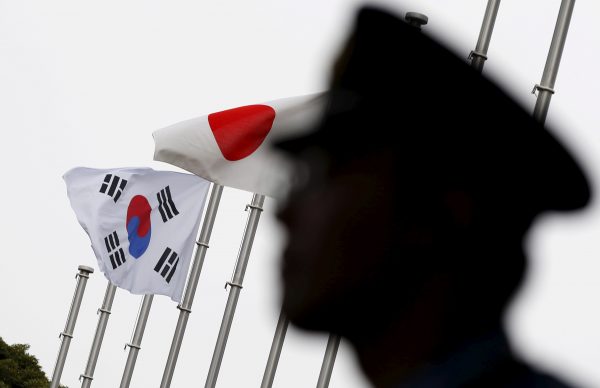To be clear, it is the politicisation of history that is fuelling tensions. In July 2019, Japan politicised history by abusing trade measures to resolve a political dispute: specifically, by moving to restrict exports to South Korea of materials critical to the manufacture of semiconductors and smartphone displays after the 2018 South Korean Supreme Court ruling that favoured compensation for Korean wartime laborers from two Japanese companies. Holding currency swaps hostage to bilateral politics over historical disputes falls into the same category.
In August 2019, Japan dropped South Korea from its ‘white list’ of countries receiving breaks on exports of certain critical items from Japan. Similarly, South Korea downgraded Japan from its list of countries receiving preferential treatment in trade. On 22 August, Seoul announced that it will no longer allow the General Security of Military Information Agreement (GSOMIA) to automatically renew. The GSOMIA’s specific purpose is to ensure the protection of classified military information. It attempts to prevent intelligence leaks by strengthening trust and elevating the quality of information being shared between countries.
Economic relations between the two have often managed to keep rolling despite souring politics. For instance, the first one-on-one meeting between former South Korean president Park Geun-hye and Japanese Prime Minister Shinzo Abe did not occur until November 2015, well after Park came into office in 2013. Economic relations between the two were mostly driven by economic issues — not political ones — and the two managed to conclude 15 rounds of negotiations concerning the China–Japan–South Korea trilateral Free Trade Agreement.
This is perhaps why the non-renewal of the GSOMIA has been imbued with such fatalism as now both trade and security cooperation are suffering. But trade disputes are merely symptoms of a larger problem. The more pressing question is not so much that history has a hand in driving tensions, but rather the timing of it — why now?
The answer has to do with both geopolitics and domestic politics. The focus here will be on the macro view.
One of the most fundamental shifts in the post-Cold War period in Northeast Asia has been the re-alignment of great powers. Prior to the Cold War, South Korea and Japan were clearly nested under the US security framework. This came under doubt as China emerged as a potential counterbalance to the United States. Japan has remained within the US orbit for the most part, but South Korea has walked a more delicate path owing in part to Seoul’s efforts to fulfil its growing ambition for status and autonomy — both within the US alliance and abroad. South Korea’s per capita GPD has grown 17-fold since 1980, a huge feat given the jump is second only to China during the same period.
Yet no matter how much Seoul contends that it acts according to its own national interests, it is constantly tested about its ‘dual loyalties’ and is accused of ‘trying to have it all’. For example, Seoul needed to placate Beijing after deploying the US Terminal High Altitude Area Defense system. Even the domestic populace in South Korea has sometimes adopted this false dichotomy, as did the early opposition to GSOMIA that claimed that GSOMIA is testament to buckling under US pressure to facilitate the US–Japan–South Korea trilateral security framework.
In another example, the ongoing ban by the United States against Chinese telecom giant Huawei has effectively created a public test of allegiance. Seoul has opted for strategic ambiguity in contrast to Tokyo, which has effectively followed in the United States’ footsteps by banning Huawei.
In short, Seoul’s national interests have evolved since the Cold War rhetoric of anti-Communism, which facilitated organic cooperation with both Japan and the United States. Its latest action of non-renewal of GSOMIA demonstrates the complexity of Seoul’s interests, including its aspirations for greater fluidity in inter-state relations with all major actors including China and North Korea as well as the United States and Japan. Unfortunately, an intensified US-China rivalry will demand greater transparency from state actors, not less. Therefore, the Japan–South Korea dissonance will only continue so long as alignments become more rigid and South Korea’s actions are framed as hurting the US–Japan–South Korea partnership. Given the direct impact that larger geopolitics have on the Japan–South Korea relationship, Seoul’s manoeuvres vis-à-vis China and the United States will have important ramifications in its dealings with Tokyo.
For now, short of some sudden US–China unity, what options are available for keeping the Japan–South Korea dispute from escalating? There are some immediate principles that both sides should abide by.
First, policies (and mindsets) of retaliation do not lead to resolution. While Japan weaponised trade with its July decision to restrict exports to South Korea, South Korea escalated tensions by using GSOMIA as retribution.
Second, the conflict will be more easily resolved if protesters can separate the administration from its people. This means that South Korean demonstrations against Japan need to be anti-Abe rather than anti-Japan and vice versa.
Similarly, bilateral exchanges and cooperation at non-national levels should be shielded from high politics. The news that several South Korean cities had suspended their exchanges with sister cities in July 2019 stiffened public sentiment and made negotiations at the national level less likely.
The benefit of attributing tensions to people rather than history is that it instils the sense that events are within one’s control. Neither Seoul nor Tokyo are destined for conflict.
Dr Jiun Bang is a Visiting Scholar at the Korean Studies Institute at the University of Southern California.

